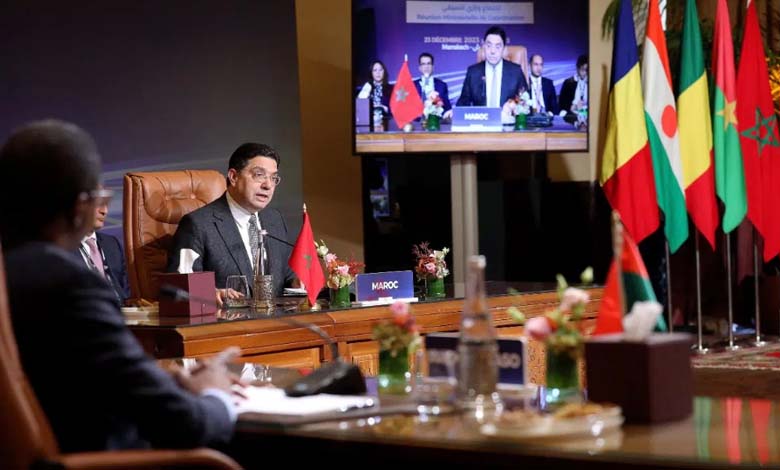Commitment to the Atlantic Initiative Sets the Stage for Broader Cooperation between Morocco and Sahel Countries

Morocco’s quiet yet effective diplomacy, led by King Mohammed VI, is laying the groundwork for wider and faster engagement of Sahel countries in the Atlantic Access Initiative.
The foreign ministers of Burkina Faso, Mali, and Niger, during a meeting with King Mohammed VI in Rabat, pledged to “accelerate” the implementation of Morocco’s initiative to grant their countries access to the Atlantic Ocean, according to the Moroccan news agency (MAP).
King Mohammed VI welcomed Burkina Faso’s Karamoko Jean Marie Traoré, Mali’s Abdoulaye Diop, and Niger’s Bakary Yaou Sangaré “within the framework of the strong and historic ties” binding their countries to the Kingdom.
-
The Atlantic Initiative is attracting increasing international attention
-
Algeria creates its isolation by punishing African countries joining the Atlantic initiative
The ministers praised the initiative and reaffirmed their full commitment to expediting its execution. Originally proposed by the king in 2023, the initiative envisions granting landlocked Sahel nations access to the Atlantic Ocean via Moroccan territory—especially the contested Sahara region, claimed by the Polisario Front backed by Algeria.
Although a timeline has not yet been announced, the initiative is expected to materialize through a network of transport and infrastructure projects, potentially transforming economic integration and boosting cooperation with the European Union.
-
The Atlantic Initiative Foils Polisario’s Bet on Instability Strengthening
-
Morocco begins Atlantic Initiative by reducing buffer zone with Mauritania
The three ministers welcomed the plan as a vital opportunity amid political and economic isolation. The Burkinabé minister described their countries as facing a form of “political and economic blockade,” while his Malian counterpart emphasized the strategic importance of “diversifying access to the sea.”
The Nigerien minister called the Moroccan initiative a “lifeline for our isolated countries.”
Burkina Faso, Mali, and Niger—landlocked states now ruled by military governments following coups between 2020 and 2023—have drifted from France and strengthened ties with Russia. Unlike Algeria, Morocco remained neutral, advocating non-intervention and dialogue.
-
African countries discuss the implementation of the royal initiative for access to the Atlantic in Marrakech
-
The Islamic Summit praises the success of Morocco’s political and humanitarian initiatives
Algeria, Morocco’s regional rival, saw its relations with the Sahel trio deteriorate after being accused of downing a Malian military drone in March 2024, prompting Morocco to recall its ambassadors.
Morocco’s Africa diplomacy revolves around five key pillars:
- Historical and Cultural Bonds: Morocco leverages longstanding political, cultural, and religious ties, training African imams through the Mohammed VI Foundation and supporting mosque construction, enhancing its image as a moderate power.
- South-South Cooperation: The kingdom seeks balanced, mutually beneficial partnerships, heavily investing in Africa’s development and sustainable growth.
- Institutional Engagement: After rejoining the African Union in 2017, Morocco has played an active role in promoting peace and development, including serving on the AU Peace and Security Council.
- Economic Diplomacy: Morocco prioritizes trade and investment in Africa and integrates its businesses into continental value chains. Strategic initiatives like the Atlantic Initiative and the Africa-Atlantic gas pipeline aim to bolster regional integration.
- Moroccan Sahara Issue: The Sahara remains central to Morocco’s diplomacy. By promoting a realistic and transparent approach, Morocco has gradually eroded support for the Polisario Front and reinforced recognition of its territorial integrity.
-
Larcher’s Visit to the Moroccan Sahara Reflects France’s Interest in Strengthening Cooperation with Rabat
-
Morocco and Mauritania Explore New Avenues for Military Cooperation
While some African countries still back the separatist cause, Morocco’s autonomy plan (2007) continues gaining momentum, supported by major powers like the U.S., France, and Spain.
Overall, Moroccan diplomacy in Africa is intensifying, affirming the kingdom’s position as a key regional player—while Algeria struggles to maintain its traditional influence and faces growing isolation.
It is expected that these countries will eventually join the settlement process proposed by Morocco, due to the decisive international developments surrounding the issue—most notably the recognition by major powers such as the United States, France, and Spain of Morocco’s sovereignty over the Sahara.
-
Russia Maintains Positive Neutrality on Western Sahara Issue to Boost African Interests
-
Morocco Urges Algeria to Engage in Peace Rather than Chasing Illusions
Overall, Moroccan diplomacy in Africa is experiencing intense activity and notable progress, driven by the Kingdom’s ambition to strengthen its position as a key regional actor and contribute to building a prosperous and secure future for the continent.
Algerian Confusion
In light of the shifting dynamics across the African continent and the challenges facing Algeria, signs of “confusion”—or at least serious challenges confronting Algerian diplomacy—have emerged. This does not necessarily imply complete failure, but rather difficulties in adapting to the new geopolitical landscape and maintaining traditional influence. Consequently, Algeria is becoming increasingly isolated regionally and internationally, struggling to rebuild its relations, particularly within its African sphere.
-
Morocco: A Safety Valve in the Sahel Region
-
Italy Commends Progress and Stability in Morocco Under the Leadership of King Mohammed VI
This confusion is reflected in several aspects of Algerian diplomacy, notably the issue of the Moroccan Sahara, which remains a major point of contention affecting Algeria’s relations with several African countries, especially those that have voiced support for Morocco’s stance.
The weakening of the traditional African consensus on this matter also places growing pressure on Algerian diplomacy. The unraveling of support for the separatist narrative promoted by the Polisario Front—backed politically by Algeria—has exposed the illusion behind this movement and its sponsor, further deepening their isolation.
The increasing regional competition with Morocco poses an additional challenge to Algerian diplomacy in Africa, particularly in the areas of investment and political influence.












